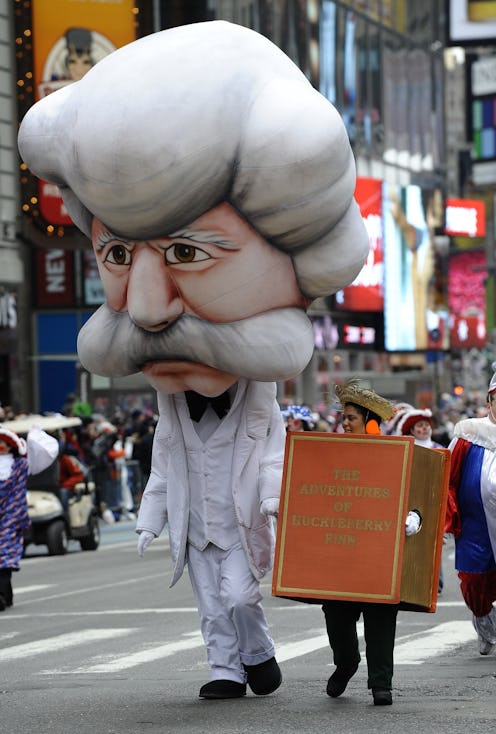Books
Philadelphia School Drops 'Huck Finn,' But Why?
Mark Twain's classic novel The Adventures of Huckleberry Finn has long been a favorite in high school English classes — and a favorite target of bans and challenges from parents and community members. Recently, a Philadelphia school dropped Huckleberry Finn from its curriculum, but for once the decision doesn't seem to be the result of an effort to censor students' reading materials. Instead, the concern was voiced by the students themselves.
Choosing books for a curriculum is always a bit of a tricky thing. There are, after all, lots of possible titles and none of them is perfect. And the case of Huckleberry Finn involves even more complicated considerations. At the time it was written, the book outraged many for its decidedly anti-racist stance and its critique of prevailing ideas at the time about racial inferiority of black people. Today, however, the book isn't quite as progressive as it was in 1885, particularly in light of its liberal use of the n-word. At a time when racial slurs are rightly seen as unacceptable — and when people are demanding better, more well-rounded portrayals for people of color — Huckleberry Finn can cause a lot of friction.
But at the same time, it's an American classic, one that provides a good deal of insight into and important social commentary on life in the antebellum South. And it's written by one of America's most iconic and well-respected authors. There's a reason we still read Mark Twain all these years later.
So should The Adventures of Huckleberry Finn still be taught in school? And how should individual schools go about making that decision?
Well, at the Friends’ Central School in Montgomery County, Pennsylvania, school administrators decided to weigh the potential benefits of the book against the potential harm it could do. After multiple students expressed concern over the book, and after a forum for students and faculty to discuss the book, the administration decided to pull the book from its 11th grade curriculum, though it will still remain in the school library.
"We have all come to the conclusion that the community costs of reading this book in 11th grade outweigh the literary benefits," school principal Art Hall said in a letter to parents. John Mark writing for the Philadelphia Inquisitor argues that Mark Twain himself might have agreed. After all, young adult wasn't a genre in Twain's time, but still Twain was always writing for adults, not young people.
Censoring young people's reading materials and trying to tell teachers what they are and are not allowed to teach to their students is always objectionable, but it's another matter entirely for schools themselves to make difficult decisions about curricula. After all, half the reason why I find it outrageous that parents and community members try to dictate what's taught in schools is that educators are much better equipped to make such decisions.
Plus, I also believe that students are able to speak for themselves and express whether or not a particular title makes them upset or if they find it objectionable — which not only means that parents shouldn't presume that they can speak on behalf of their teens, but also that teachers and administrators should listen when teens do speak up. The book is still in the library where interested students can still find it, but no one is forced to read it who might be upset by its portrayals.
So should Huckleberry Finn still be taught in schools? Well, if anything, that's a decision for individual schools and school districts to weigh for themselves. It's certainly not an easy call to make.
